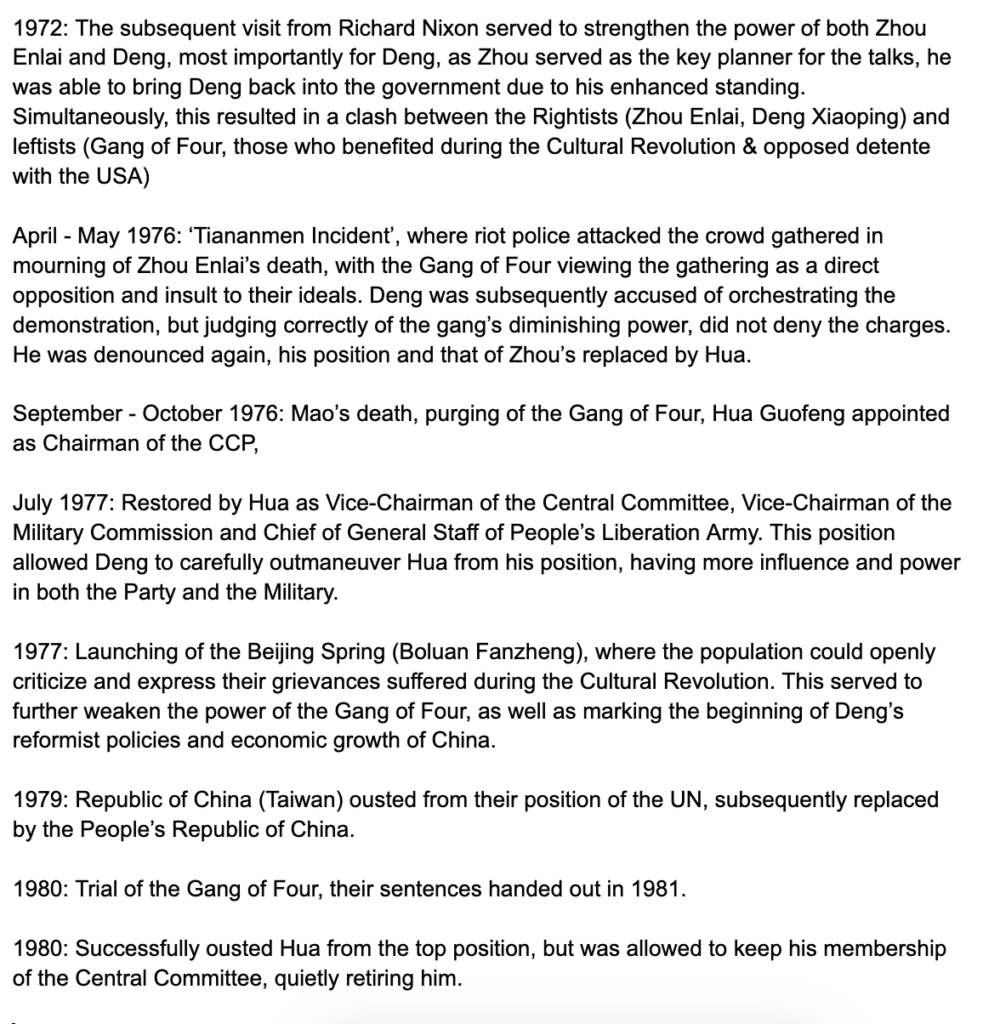This section focuses on China under the rule of the Chinese Communist Party, and the great changes as the Communist Party under Chairman Mao Zedong (Mao Tse-tung) extended its rule and Mao’s vision of a socialist state. The focus of this section is on the impact of domestic political, social and economic policies. It also examines the modernization of China’s economy since Mao’s death.
- Consolidation of the communist state (1949–1961) under Mao Zedong; key policies; land reforms; rectification campaigns; Hundred Flowers campaign (1956)
- Transition to socialism; successes and failures in economic developments (1949–1961); First Five-Year
Plan; Great Leap Forward; Second Five-Year Plan - Social developments; women’s rights; health; education
- Great Proletarian Cultural Revolution: causes; Gang of Four; political, social and cultural impact
- Foreign policy and foreign affairs 1949–1976; Sino-American relations; establishment and breakdown of Sino-Soviet relations; China as a regional and global power
- Power struggle following the death of Mao Zedong; Hua Guofeng, the re-emergence of Deng Xiaoping and the defeat of the Gang of Four
- China under Deng Xiaoping (1976–1997); economic developments; Four Modernizations; political developments; causes and effects of Tiananmen Square (1989); Jiang Zemin

This section will focus on the period 1976 to 2005, Mao’s reign is covered in these links:
Hua Guofeng
Deng Xiaoping 1978-1989
If you have read the historiography of Mao and China in the twentieth century, you will have come across Rana Mitter. He is one of foremost experts on China is useful to include in your analysis of perspectives. In the link below, he is discussing the Chinese leader, Deng Xiaoping.
A summary of the video above is as follows:
- Deng came from a middle-class background, one sufficient to send him to France in 1920 to further his studies. However, he learned about socialism and revolutions in his time there, especially after having worked in factories for low pay.
- He met Zhou Enlai here and became friends, this was to last until his death in 1976.
- He met Mao on returning to China (Wuhan) in the later-1920s.
- Deng was with Mao on the infamous Long March.
- When the CCP took power, Mao ordered him to annex both Tibet and Xinjiang into China, this he did with brutal force. Deng was also instrumental in the Anti-Rightist Movement of 1956-57.
- By the late-1950s, Deng had established a power base, one that would support him many years later.
- He initially supported the Great Leap Forward but, after seeing some of the severe consequences, took a moderate attitude towards the plan. In the 1962 Seven Thousand Cadres Conference, Mao criticised himself for the failures of the ‘Leap’, possibly under pressure to do so. Deng and Liu Shaoqi became more prominent in the CCP as a result.
- However, Mao took revenge on the two men when the Cultural Revolution began. Deng was denounced despite trying to backtrack on his thoughts at the Conference. He was forced to work in agriculture for several years as punishment. His son was also thrown out of a window in 1968, permanently paralysing him.
- Deng was recalled in 1973, largely because of Zhou Enlai.
- But in 1976 Zhou died and Deng wanted to respect his memory – the popular protest that ensued was blamed on him and he was denounced again.
- However, after Mao died his successor Hua arrested the Gang of Four and was pressured to bring Deng back. He did but soon afterwards perhaps realised that he lacked the support that Deng had.
- In December 1978, Deng took power with a speech discussing China’s Reform and Opening-Up policy.
Deng’s Rise to Power
Timeline of Deng Xiaoping taking power:

Deng’s Economic Miracle?
Watch from 05:30 to …
- Describe the special economic zones. How did they help the Chinese economy grow?
- How did hukou help the economic and social changes within China?
- Was the one-child policy a success?
Special Economic Zones (SEZ)

Five-Year Plans
BUT
Frank Dikotter argues that some of the economic progress comes from below, not the CCP hierarchy. Peasants were abandoning collectivisation before Deng Xiaoping decided to do so.


Tiananmen Square
Jiang Zemin 1989-2002
Averting Escalation and Avoiding War: Lessons from the 1995–1996 Taiwan Strait Crisis
Here is Frank Dikotter again explaining how Jiang changed China.



If you want to read more on Dikotter and Jiang, I have the book in the classroom.
Hu Jintao 2002-12
